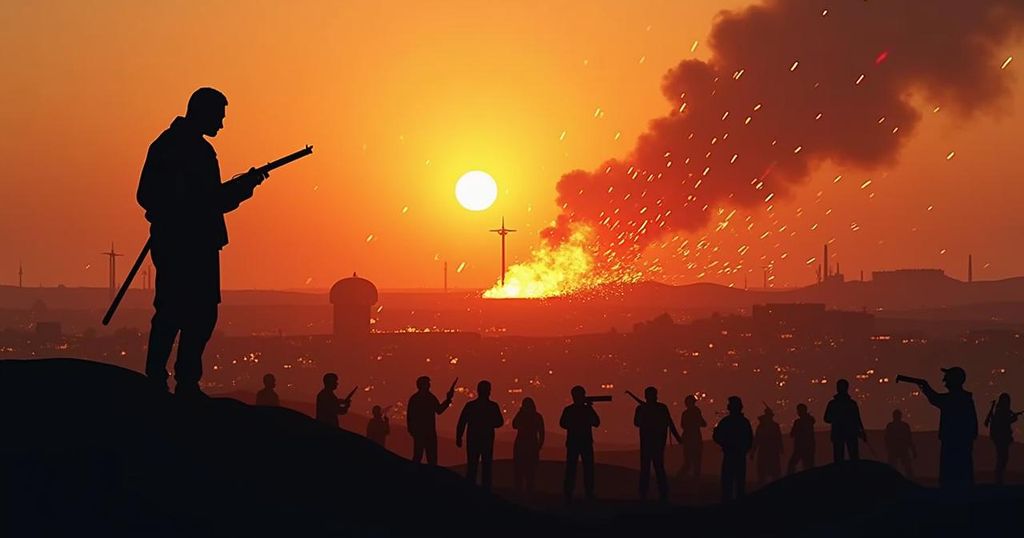Implications of Hassan Nasrallah’s Assassination for the Middle East

The assassination of Hezbollah leader Hassan Nasrallah by Israeli forces marks a significant shift in the Middle East, likely destabilizing Hezbollah and challenging regional dynamics. The attack, which killed other top officials, could provoke Hezbollah’s military response. It complicates U.S. diplomatic efforts, revealing a lack of long-term strategy from Israel and raising uncertainties regarding Lebanon’s future amid ongoing conflicts.
The recent assassination of Hassan Nasrallah, the influential leader of Hezbollah, signifies a pivotal shift in the dynamics of the Middle East. Nasrallah was not only a revered figure within the Shiite community but also a contentious adversary to rival factions, establishing Hezbollah as a formidable entity in regional politics since its inception thirty-two years ago. This sudden loss is anticipated to lead to significant political upheaval within Hezbollah, a group recognized for not only its military prowess but also its extensive social network. The Israeli strikes, which killed multiple high-ranking Hezbollah officials and civilians, represent a tactical escalation in the conflict, with experts asserting that the attacks could provoke Hezbollah to respond with heightened aggression. Prior to his death, Nasrallah was integral in shaping the group’s military strategy and alliances, especially following the assassination of Iranian General Qassem Soleimani in 2020. Despite the loss of its charismatic leader, Hezbollah is expected to remain a potent military force, as it harbors thousands of combatants with recent battlefield experiences in Syria. The Israeli operation, executed under the directive of Prime Minister Benjamin Netanyahu, directly undermined ongoing U.S. diplomatic efforts for a ceasefire, showcasing disjointed international coordination. Israel’s history of military operations highlights a recurring theme: while tactical victories are achieved, the absence of a cohesive long-term strategy exacerbates regional tensions. The current instability in both Gaza and Lebanon aids in the proliferation of extremist factions, and unless the Lebanese state can regain control from Hezbollah, the power vacuum may perpetuate further conflict. In response to Nasrallah’s assassination, Iranian officials, including Ayatollah Ali Khamenei, convened urgently, signaling that Nasrallah’s death has implications that extend beyond Lebanon, potentially destabilizing the broader region. President Biden characterized the assassination as “a measure of justice” reflecting the historical grievances against Hezbollah but acknowledged the small prospects for de-escalation in the present landscape.
Hassan Nasrallah’s assassination is a significant event in Middle Eastern geopolitics, with deep-rooted implications for Hezbollah, Israel, Iran, and U.S. involvement in the region. Since Nasrallah took the helm of Hezbollah in 1992, the organization has evolved from a small militant group into a dominant political and military power, challenging the Lebanese state and engaging actively in regional conflicts. The current context, with ongoing violence between Israel and Hamas and the fragile state of Lebanon, adds layers to the repercussions of Nasrallah’s death. The response from Iran and the U.S. signals a broader narrative involving national security, diplomatic relations, and the potential for continued conflict in the region.
The assassination of Hassan Nasrallah marks a critical juncture in the Middle East, with potential ramifications for Hezbollah’s future and the balance of power in Lebanon. While Israel has succeeded in eliminating a key adversary, the long-term consequences remain uncertain as Hezbollah has proven resilient in the face of leadership losses. As tensions escalate, the urgent need for effective diplomatic interventions becomes increasingly clear, underscoring the challenges facing the United States and its allies in navigating the complexities of Middle Eastern politics.
Original Source: www.newyorker.com








